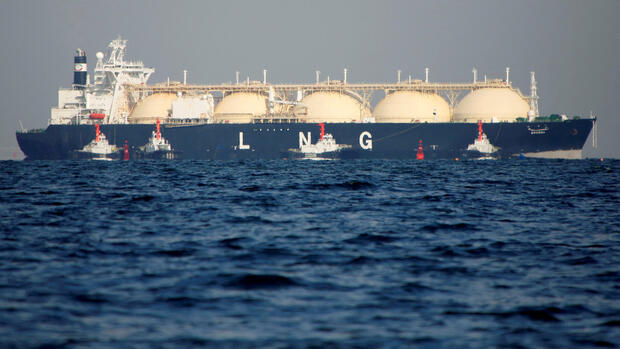Berlin The gas supply situation is likely to remain tense in the coming years. Due to the strong global demand for liquefied natural gas (LNG for short), it is therefore advisable to secure access to LNG through long-term supply contracts.
This is the result of an as yet unpublished Prognos study commissioned by the Science Platform Climate Protection (WPKS). The WPKS is an expert committee set up by the federal government in June 2019. She advises the federal government on climate protection issues.
The study deals with various scenarios for the development of gas demand and addresses in particular the question of whether the capacities of the LNG terminals planned in Germany are sufficient to cover the gas demand. The authors write that “in all scenarios in the short term in 2023 and 2024 there is a threat of strong competition for the available LNG quantities”. From 2025, the global LNG demand can be covered.
However, according to the study, under unfavorable circumstances in Germany there could also be a situation in 2025 in which the existing LNG import infrastructure is not yet sufficient.
That would be the case if high domestic demand were met with maximum gas transit abroad, while the largest import pipeline from Norway failed and Russia completely stopped the remaining gas transit through Ukraine to Eastern Europe.
The authors write that the currently planned expansion of floating LNG terminals, known in technical jargon as Floating Storage and Regasification Units (FSRU), could be justified over the next few years in order to maintain security of supply.
The report thus provides the Federal Ministry of Economics with new arguments. In the acute gas supply crisis resulting from the Ukraine war, the German government decided in 2022 to charter five FSRUs at short notice. Two of these five FSRUs (“Federal FSRU”) are already in operation. A third, which was procured purely privately, is also working. So far it is the only FSRU in the Baltic Sea. The other projects are in the North Sea.
LNG “as flexible as possible“ shopping
Various experts had come to the conclusion that the planned FSRU capacities were oversized and cemented the use of the fossil fuel gas.
The ministry disagrees with this assessment. The FSRU capacities in the North Sea that have been commissioned or are under construction could only replace around half of the lost Russian gas supplies, even at theoretical full capacity.
Even with pipeline imports from Northern and Western Europe, especially from Norway, Belgium and the Netherlands, this gap cannot be closed. “In order to maintain security of supply and affordability, the expansion of additional gas import capacities is therefore necessary. We also need safety buffers as a precaution in the event of disruptions,” says the ministry.
The Prognos experts recommend striving for long-term supply contracts. “Since it is already becoming apparent that there will be considerable competition for global LNG volumes, particularly in the next few years, buyers who have bought LNG over the long term have an advantage,” says the report.
>> Read also: Brussels rejects Berlin’s plans for new gas-fired power plants
In addition, the experts advise European buyers to make LNG contracts “as flexible as possible in terms of delivery location and duration”. There should be “the option to sell volumes to other world regions if LNG demand falls.” However, climate protectors warn against long contract periods because they are convinced that they contradict the climate protection goals.
Just last week, the nationalized German gas importer Sefe announced that it had signed a contract with the US LNG producer Venture Global LNG for the annual supply of three billion cubic meters of LNG. The contract has a term of 20 years.
Sefe points out that you determine the destination of the cargo yourself. The LNG could therefore easily be sold to other regions of the world if demand in this country falls.
Experts urge caution
With a view to plans to replace the FSRU with permanently installed LNG terminals within the next few years, the experts urge caution. “Against the background of possible overcapacities in the long term, we consider cautious planning to be necessary, especially for the fixed LNG import terminals,” they write. In fact, the demand for LNG is likely to decline significantly in the coming decade, as otherwise the climate protection goals could not be achieved. However, the developers of stationary LNG terminals point out that their systems are also suitable for processing climate-neutral gases.
This aspect is highlighted in another expert opinion, also commissioned by WPKS from Prognos: According to this, there is a fundamental risk that stationary LNG terminals will bring “lock-in effects” with them. This refers to situations in which users of a certain technology do not switch from one technology to another, more promising technology due to high switching, search or investment costs. The authors advise that this risk must be ruled out. They recommend: “The legislature should work towards subsequent use. The subsequent use of the terminals should already be considered and stipulated when planning the construction of the stationary facilities.”
This consideration is taken into account in the LNG Acceleration Act: Land-based terminals may therefore only be operated with natural gas for a limited time in order to ensure sustainable, climate-neutral subsequent use from the outset. Green hydrogen and its derivatives – such as ammonia – will later be imported via the terminals.
More: Germany’s most important gas supplier dampens optimism
